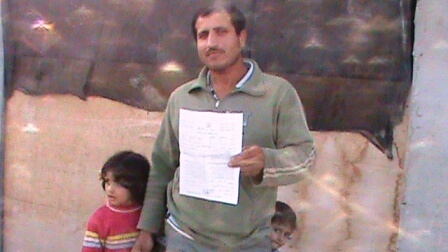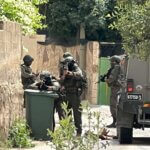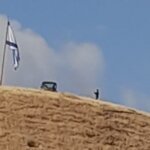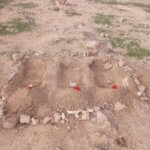Demolition orders in Abel al Ajaaj
 To see our photos of demolition orders in Abel al Ajaaj click here
To see our photos of demolition orders in Abel al Ajaaj click here
At 12pm on December 12 2011, Israeli Civil Administration accompanied by two military jeeps served demolition orders on two homes in Abel al Ajaaj.
The first was served to Omar Ali Ahmed Salem, Abo Hanya. His wooden house is home to himself, his 6 daughters and his 2 sons.
The second was to Ayman Metab Mahmoud Ideas. He lives with his 3 daughters and 1 son in a house built of concrete blocks.
Abu al Ajaj is an old farming community in Al Jiftlik. From 1948 to 1967 thousands of Palestinian lived there is a refugee camp. After occupation in 1967, Israel destroyed the camp and levelled all the ground. In 1970 they established, Massu’a, a large agricultural colony. Today, 142 Israeli settlers live here controlling 817 dunums (1 dunnam = 1km)producing: Grapes, dates, flowers and vegetables for export to Europe. Massu’a colony, like all settlements in the Jordan Valley, benefits from warm temperatures in the winter, fertile soil, unlimited water from Mekerot (Israeli state company), 75% subsidy on electricity and cheap Palestinian labour. In addition, they are geographically closer to Europe than food exporters in the southern hemisphere. As a result, settlements can charge a high price for their produce. Continuing the occupation and system of apartheid is a necessity for them to maintain large profits.
About 25 Palestinian families, mostly farmers, live in Abu al Ajaj, but Israel has made it illegal for Palestinians to live in the area declaring their land a ‘closed military zone’. The community are resisting attempts to ethnically cleanse them from their land and are refusing to leave. Living in area C (under full Israeli control) means they are prohibited from having access to running drinking water, electricity or basic services like health care and education. Israeli pipes pump fresh water through the community and runs electricity cables over their heads to the settlement. When standing in parts of the village, advanced irrigation systems can be seen watering grape behind a fence and only a few meters away families who have lived on the land for generations are forced to survive on water from portable tankers. Inhabitants are also prohibited from renovating or expanding their homes which means Palestinians suffer from poor living conditions in simple structures mainly constructed with plastic and metal. These become extremely hot during summer and cold during winter.
Over the last decade this community have faced persistent harassment from the settlers in Massu’a, who have gradually taken more and more of their land using threats and violence. This has been backed up by the Israeli Army and Police, who have often accompanied the settlers, looking on as they openly steal the land of this Palestinian community, and demolishing their homes and animal shelters on a regular basis.





